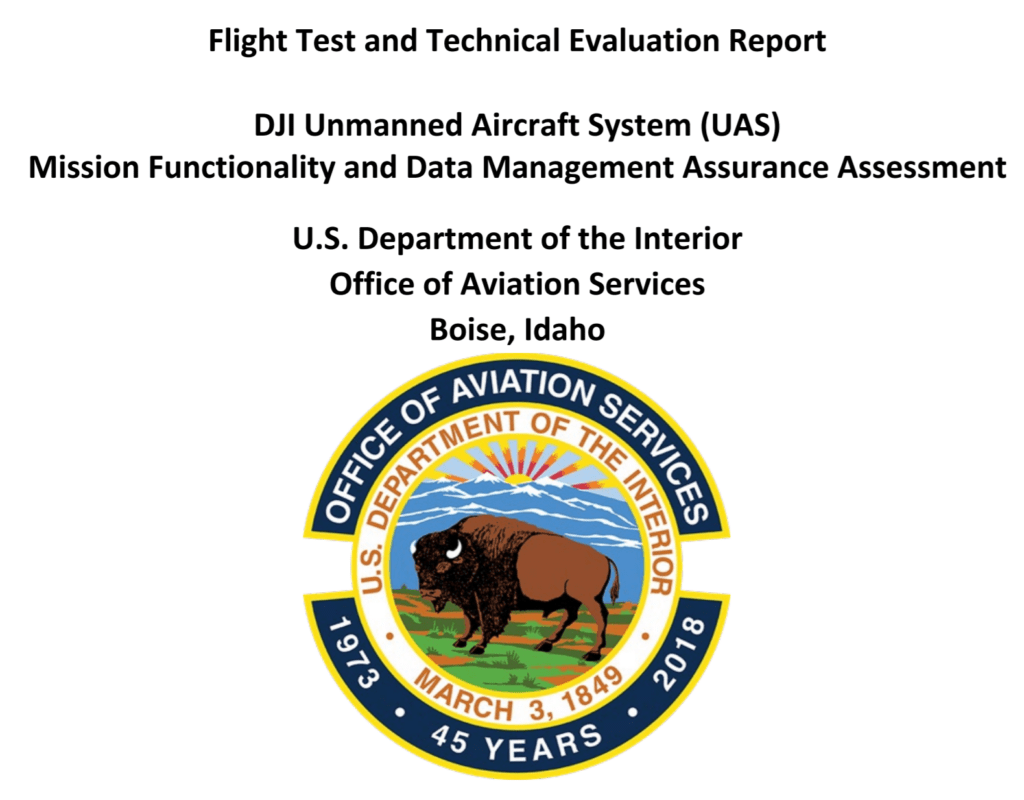The US Department of the Interior has completed an independent 15-month analysis and validation of DJI’s Government Edition Solution.
The news represents a significant and positive step in DJI’s ongoing struggle to prove its customers’ data is safe.
The Chinese manufacturer’s hardware and software are relied upon by government and industry for all sorts of sensitive missions. The company is also an industry leader in a field littered with American failures. Unfortunately for DJI, both factors have been a recipe for intense scrutiny in recent years.
Government Edition, which was announced last month in yet another step towards appeasing concerned government agencies, has been cleared for takeoff after more than 15-months of rigorous assessment.
The US Department of the Interior validated the flight, payload, and data management assurance performance of DJI Matrice 600 Pro and Mavic Pro drones equipped with Government Edition firmware and software.

“No indication that data was transmitted outside of the system…”
The main DOI’s findings were presented in a flight test and technical evaluation report issued last week. Key points included:
1. DOI has been working with DJI for over two years to create a solution that would allow its bureaus access to DJI’s high-quality off-the-shelf hardware equipped with custom firmware and software to prevent intentional or unintentional data leakage to any outside entities.
2. Testing of the Government Edition solution began in April of 2018 as part of the three-phase testing plan developed by DOI.
3. Testing included 1,133 flights totaling 298 hours on the DJI Matrice 600 Pro and 1,112 flights totaling 240 hours for the DJI Mavic Pro drones.
4. DOI collaborated with the National Aeronautics and Space Administration (NASA) Kennedy Space Center as well as other industry and federal partners with expertise in data management assurance testing to conduct targeted assessments of Government Edition hardware, firmware, and software.
5. During testing there was no indication that data was being transmitted outside the system, confirming that they were operating as promised by DJI.
“The Department of Interior’s report validates DJI’s effort to build software and hardware solutions that meet the evolving data security needs of its customers,” said Mario Rebello, Vice President and Regional Manager of North America at DJI.
“The DOI has a strong track record of leadership within the U.S. Government for its ability to pragmatically evaluate and implement drone technology for use across a wide variety of applications. We appreciate their partnership and value the collaborative effort to help create a DJI drone solution that will allow emergency first responders and others to save lives and effectively manage our public lands. We look forward to continuing to support the Department of Interior and other federal agencies with DJI’s industry-leading drone technology.”
The caveat: DOI doubts Government Edition’s sustainability
There is a small but significant caveat in the report’s concluding remarks.
Government Edition’s unique architecture ensures that drone data – including photos and videos captured during flight – can never be intentionally or accidentally shared with unauthorized parties.
Government Edition features a permanently enabled Local Data Mode within a custom DJI Pilot application and the option for government agencies and IT departments to conduct firmware reviews in electronic isolation before applying them to their fleets.
However, the report concluded with a couple of obvious points. Both revolve around the fact that drones require regular updates from manufacturers to keep them optimized and flying safely. The first things to note is the DOI states “that observed test results cannot be extended to future DJI GE software, firmware, or hardware updates.”
And second, that subsequent Government Edition updates “will require additional validation and verification (V&V) testing before approvals can be granted for future versions.”
Because the DOI thinks this “necessary V&V testing of future updates will result in added program costs and delays, dependent on the number and complexity of proposed changes,” a further conclusion is that DJI’s Government Edition by itself “does not represent a long term, sustainable solution…”
It’s not clear if this time-consuming and costly validation of future updates would be necessary were DJI not a Chinese company. In any case, the DOI has recommended that the two tested systems be used only on “missions that collect non-sensitive, publicly releasable data to increase their viability”.
From our understanding, the conclusion then is this: The DOI trusts the current DJI Government Edition systems, but doesn’t see validating future updates on a regular basis as a feasible long term option.
Having said that, DOI market research has found there are currently no domestically available alternatives that are competitive in price, required mission and security performance, and necessary scalability to the two tested DJI GE systems.
Which leaves us in an interesting position. As it stands, DJI’s Government Edition can be trusted and is the only viable solution for the DOI. The question is whether the cost of maintaining that trust outweighs the potential benefits of using DJI drones.
You can read the full report here: Department of the Interior, Flight Test and Technical Evaluation Report
Malek Murison is a freelance writer and editor with a passion for tech trends and innovation. He handles product reviews, major releases and keeps an eye on the enthusiast market for DroneLife.
Email Malek
Twitter:@malekmurison
Subscribe to DroneLife here.